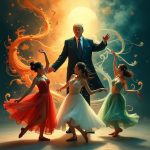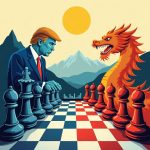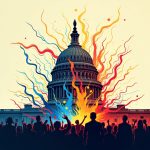In the great cosmic dance of international trade, Donald Trump has spun onto the stage like a prima ballerina with steel-toed boots. Yes, dear reader, strap in as we navigate the complexities of tariffs and global markets with Trump at the helm, brandishing tariffs as if they're the magic wand set to solve all of America's trade woes. Together, we'll dive into the enigmatic mind of Trump and the implications of his tariff tinkering on global trade.
This article discusses perspectives shared by Peter Zeihan in his insightful analysis of the Trump administration's tariff policies. No rabbit holes will be left undug. We promise there will be more surprising twists and turns than a roller coaster designed by M.C. Escher himself.
Peter Zeihan, the sage of Colorado, posits that Trump's affinity for tariffs isn't just a strategic maneuver but rather an end goal in itself. There's a touch of the dramatic here because, spoiler alert, this isn't the best economic policy unless you've got your industrial ducks—all lined in a neat row. For a nation like the United States, the introduction of hefty tariffs, particularly on automobiles from partners like Canada, can stir the pot of cross-border economic collaboration into a bubbling mess of inefficiency, price hikes, and consumer migraines. Imagine waking up to find the price of your dream car has ballooned overnight by $4,000 to $8,000 due to tariffs! Cue the violins for the auto industry that could crumble quicker than a sandcastle in a thunderstorm, causing ripples across Detroit and Texas.
But wait, there's more! Let’s switch gears to “reciprocal tariffs," Trump's dazzling new tool in the trade toolkit that sounds fair on paper—like evening the score in a playground game of tag. This concept involves mirroring a foreign nation's tariff on certain imports, an intellectual venture that quickly becomes a bureaucratic behemoth. Zeihan helps us understand that while reciprocal tariffs might work in theory, they are nothing short of a logistical and administrative web befitting a dystopian novel. Just consider the Herculean task of keeping tabs on hundreds of thousands of product categories, then imagine multiplying that by the 200-some countries that dot our globe. Mind you, international trade isn’t streamlined, not even close; it's more like a chaotic flea market spread across continents. Each container ship is a veritable mystery box, its innards a flurry of items and origin stories.
The plot thickens with Trump's choice of Trade Representative. Jameson Greer, a disciple of Robert Lighthizer—a trade guru from the Reagan era—finds himself walking a tightrope advocating for rational trade policies while not ruffling Trump's feathers, which, if you catch my drift, can be quite the challenge. Zeihan suggests Greer's strategy is akin to a stealthy ninja move: nod, smile, stay under the radar, and hold the fort without rocking the boat too much.
This intrigue begs a larger question: Could the Trump administration’s trade tactics bring about a self-crippling halt to international commerce and an economic nosedive? That's one potential outcome if reciprocal tariffs take the reins. Alternatively, if a more selective approach were taken—targeting only certain countries—Trump's policies might reshape international relationships as we know them. One hopes Canada is not on the hit list, but a focus on another player like India could remake the rules of engagement. Still, that's assuming someone can break it to Trump, in a manner of tactical finesse, that reciprocal tariffs tread dangerously close to calamity.
But before you start stockpiling coffee and German watches (just in case tariffs extend to your cherished imports), consider this prospective journey through the labyrinthine corridors of trade policy. Our economic futures are not merely a function of spreadsheets, government decrees, and random whims masked as strategic insights. These are stories of nations, histories, and the complex weave of alliances, agreements, and disagreements that make up the world stage.
The takeaway from Zeihan's exploration is a reminder of the delicate military precision required to wield trade policies. In this theater of commerce, there are few guarantees, and the specter of unpredictability often hovers overhead like a mischievous poltergeist.
Consider, then, the ripples of a throwaway tweet or an unexpected executive order not just as speculations etched in digital stone but as catalysts that could change the story arc of our modern world economy. Imagine if sudden trade barriers placed an unforeseeable tax on the whimsy of global commerce—a pause or a rupture in the way goods circumnavigate our planet. Yes, it might prove transformative. However, as with any good narrative, the plotline demands protagonists willing to rewrite their scripts for a new world order.
To conclude, as seasoned travelers of this blog, plunge deeper into this dialogue on tariffs and their implications. What are your reflections on the dynamic between tariffs and trade relations? Do you see Trump's policy actions as a stroke of bold genius or misguided folly? We invite you to unfurl your thoughts within the comments below. As always, join the vibrant heartbeat of iNthacity: the Shining City on the Web, engage with fellow readers, share insights, and be part of a growing community that probes beneath the surface of global developments.
Wait! There's more...check out our fascinating short story that continues the journey: Stars of Distant Worlds
Disclaimer: This article may contain affiliate links. If you click on these links and make a purchase, we may receive a commission at no additional cost to you. Our recommendations and reviews are always independent and objective, aiming to provide you with the best information and resources.
Get Exclusive Stories, Photos, Art & Offers - Subscribe Today!

























Post Comment
You must be logged in to post a comment.